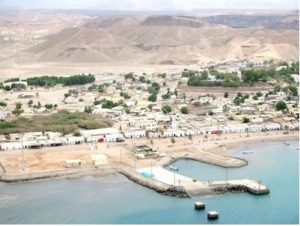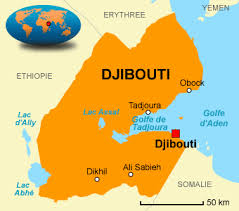By Said Jama Hussein
It was a mild and pleasant January day in Djibouti, the best time of the season in this arid part of the torrid zone. We were ten of us, all Somalis. We suddenly found ourselves on board a small naval boat accompanied by three Djiboutian officials, two guards and the skipper of the vessel. The boat had set sail from Djibouti. It was cruising the quiet serene waters of the gulf and heading towards the northern coast of Tadjoura. Whence we came and where we were destined to go had both been matters entirely out of our choosing. They were forced upon us and we submissively accepted.

It all happened suddenly during the internal strife that violently shook Aden, the capital of South Yemen, in that bloody January of 1986, when the foreign residents of that city were being hurriedly transported by ships to Djibouti as the nearest port of repatriation to their homelands. I was among a group of Somalis with their families who had fled the diabolical civil war seeking refuge in Djibouti. The said Somali group belonged to the opposition parties then fighting against Siad Barre’s dictatorial regime in Somalia.
Our arrival in Djibouti happened to be at a most inopportune time, for the country was at the time hosting the third IGAD conference which was being attended by a number of heads of African states. To our dismay, President Siad Barre of Somalia with his usually huge entourage was one of the dignitary guests. So in order to avoid any embarrassment our presence in the town might cause the Djiboutian authorities, we had to be whisked to the northern district of Tadjoura. Shortly before leaving for Djibouti, Abdillahi Enlay, a former Somali diplomat, and myself had been chosen by the group as spokesmen while we remained in Djibouti which we had no idea how long it might last.
On arrival at Tadjoura, a strange incident happened that took us by surprise. We were taken straight to a police station at the outskirts and cut off from the town. The duty officer, a plain-clothed Frenchman surrounded by few uniformed Djiboutian policemen immediately demanded to take down our names and have our finger prints. Perplexed by this new development and somewhat annoyed by his apparent haughty attitude, we adamantly refused to comply with his demand on the grounds that the government already had our names and all the other details it needed, adding for his own particular information and attention that we were the government’s guests and not criminal suspects to be interrogated at a police station.
Understandably, this unexpected turn of events alarmed some of us who could not hold back their true feeling of nervousness and scepticism. However, not very long after, while still at the police station the office telephone rang and we were beckoned to speak to the caller. The caller was the Djiboutian Minister of Interior, Yousef Shirdon. In a very gentle tone he passed to us a message of pardon from President Siad Barre adding that by his clemency the president would also lavishly bestow upon us the privilege of flying on his private presidential plane to Mogadishu where afterwards we would be officially very well taken care of.
We thanked the minister for his sincere expressions but vehemently declined the president’s offer emphasising that we were more than happy to be honoured guests of the sovereign state of Djibouti until the temporary cloud of misfortune hanging over us cleared away. Maintaining his familiar composure, the minister responded that he was only trying to be of service to us but that the decision was finally ours. With that, the talk with the minister came to an end and we were driven to the governor’s office who warmly welcomed us and seemed to have not the slightest idea about our uneasy encounter at the police station just a short while ago.
To our great delight, we were readily given accommodation at the palatial government guest house; a large multi-roomed building furnished with all the necessary services, and mounted on a high tiny stretch of land traversing the town, well placed next to the governor’s residence and the district offices. Its location was airy and offered a panoramic view of the whole town and the great expanse of the Tadjoura Gulf waters extending far beyond.
 The governor of the district was a cheerful young man of amicable character called Osman Robleh Da’ash. During our five – week stay in that district, we were warmly and hospitably treated. Whether in his official capacity as a governor or by his own personal standing Mr. Da’ash had done his utmost to make our stay enjoyable by providing us with all means of comfort by way of accommodation, meals and other recreational facilities within reach.
The governor of the district was a cheerful young man of amicable character called Osman Robleh Da’ash. During our five – week stay in that district, we were warmly and hospitably treated. Whether in his official capacity as a governor or by his own personal standing Mr. Da’ash had done his utmost to make our stay enjoyable by providing us with all means of comfort by way of accommodation, meals and other recreational facilities within reach.
As the second largest town of the young republic, coming in place immediately after Djibouti the capital, Tadjoura has a short paved runway strip along the coast capable of receiving such small aircraft as the DC3, Cessna etc. It has also a fairly well built harbour. Scores of small ships and engine-run dhows laden with a wide variety of commodities ranging from the basic food-stuff to the latest electrical appliances ply between the port of Djibouti and Tadjoura supplying the population of that district with their essential demand of goods.
The population of the coastal town of Tadjoura estimated at roughly between 20 and 25 thousand is predominantly Afars, with a large number of Somalis and several Yemeni families living in the main town. The latter group had come to this part of land many decades ago. They own shops, groceries, and run successful business. Some of them are married to Afar and Somali women. Unlike Djibouti which is plagued by its voracious daily consumption of the narcotic green shrubs of Qat imported from Ethiopia, and where the habit of drinking beer is fairly acceptable, here in Tadjoura, the people are strictly devout Moslems and show vehement intolerance to alcohol drinking. Qat-chewing is also limited to a very small number of the urban population. There is, however, a modern cinema house at the centre of the town which screens French and other western films. The turn out, mainly young people of both sexes, is oftentimes very large. The people of Tojoura are notably gentle, hospitable, and peaceful. They get on well together and the day passes quickly leaving one filled with high hopes and keener interest for the morrow.
At about 30 kms. from the coast, ascending towards the spectacular, snow-capped Dhai mountains challengingly far ahead, lies the beautiful resort of Randa. At that elevated position where the richly fragrant green vegetation abounds all over the area and basking under the cool refreshing intermittent drizzles that characterise the lovely winter weather, Randa is exceedingly attractive. Indeed, it is a sight for a sore eye! To this enchanting grandeur, we would be invited at least once a week either accompanied by the courteous governor himself or by one of his subordinates to ensure our maximum comfort.
In sharp contrast to the tranquillity inspired by the quietude of the surrounding atmosphere, French war planes were in the habit of carrying out daily exercises at the airfield of a nearby military camp situated few kms. north of the town where a government garrison was stationed. Their loud deafening noises were an irksome source of great disturbance to the local residents and shattered the peace prevailing in the neighbourhood.
On the whole, with its clear, calm blue sea, inviting sunshine all the year round, and floral rich mountain ranges, easily accessible by asphalted roads, coupled with the provision of modern means of transport and communication, the district of Tadjoura really possesses an irresistible allure for the tourists. It is now many years since I had left that remarkably peaceful town of Tadjoura, but still vivid in my memory are the people of town and their gracious governor for the unforgettable friendly attitude, loving care and generous hospitality they so lavishly accorded us during our stay in their beautiful district.
Said Jama Hussen
E-Mail:[email protected]
—
Mr. Hussein is an author and analyst on Somali language and literature. He is the author of numerous books, among them Safar aan Jaho Lahayn. He is also a regular contributor to WardheerNews and the former vice chairman of Somali Pen.This article previously appeared on WardheerNews on Feb. 23, 2010.
We welcome the submission of all articles for possible publication on WardheerNews.com. WardheerNews will only consider articles sent exclusively. Please email your article today . Opinions expressed in this article are those of the author and do not necessarily reflect the views of WardheerNews.
WardheerNew’s tolerance platform is engaging with diversity of opinion, political ideology and self-expression. Tolerance is a necessary ingredient for creativity and civility.Tolerance fuels tenacity and audacity.
WardheerNews waxay tixgelin gaara siinaysaa maqaaladaha sida gaarka ah loogu soo diro ee aan lagu daabicin goobo kale. Maqaalkani wuxuu ka turjumayaa aragtida Qoraaga loomana fasiran karo tan WardheerNews.
Copyright © 2024 WardheerNews, All rights reserved


